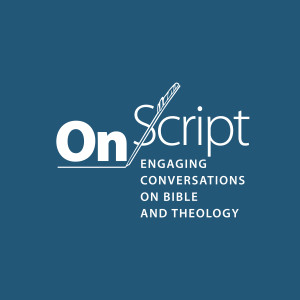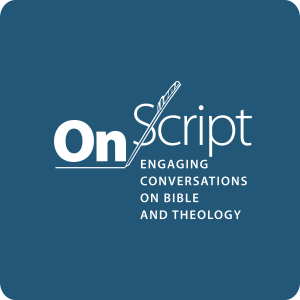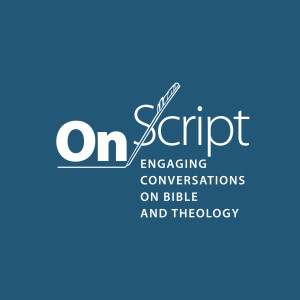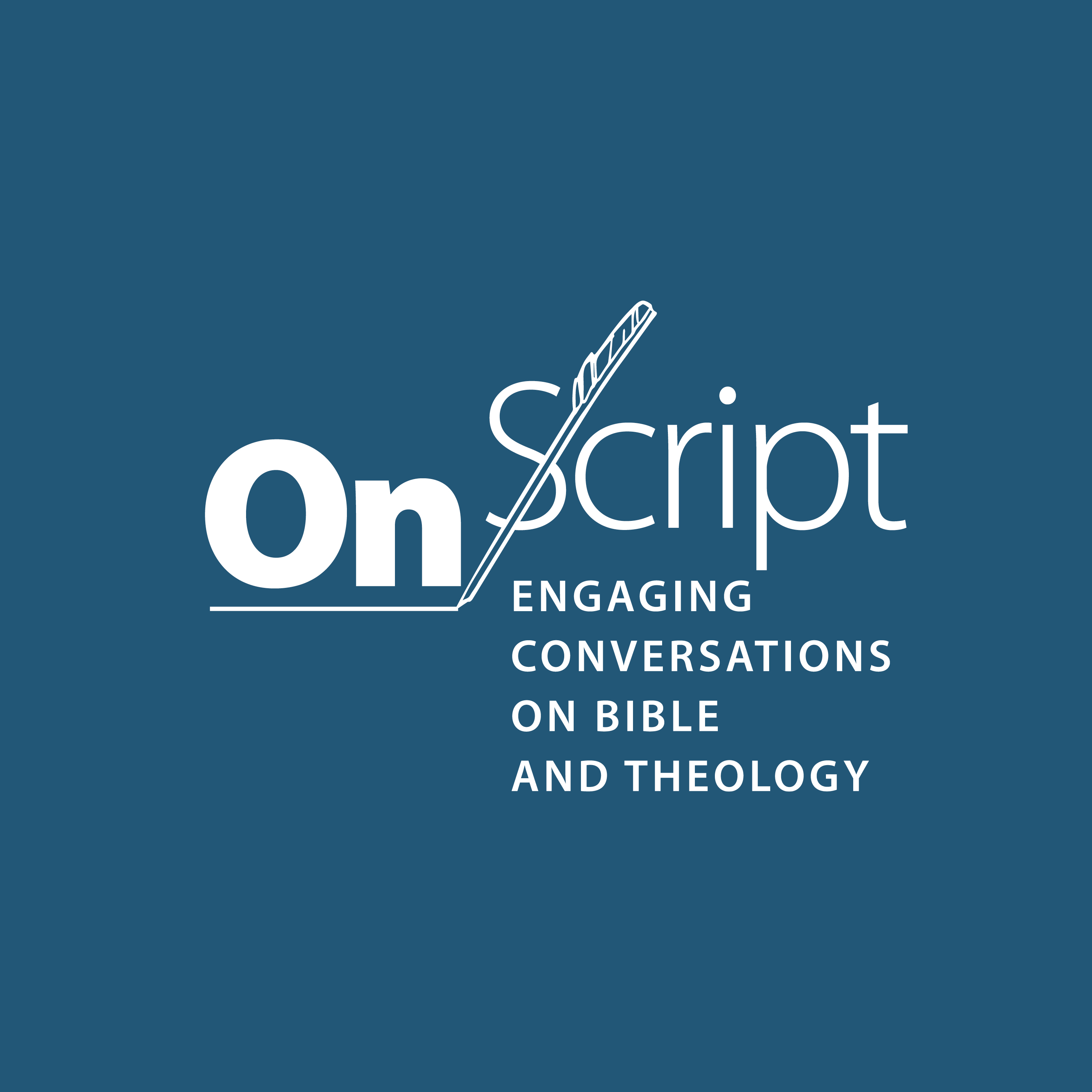Episodes

Tuesday Oct 27, 2020
Esau McCaulley - Reading While Black
Tuesday Oct 27, 2020
Tuesday Oct 27, 2020
 Episode: Dru's discussion with Dr. Esau McCaulley spans across matters of biblical theology, NT interpretation, the hermeneutics of the Black Church in America, and how his own biography has played into his scholarship. Reading While Black (IVP) is a forceful and encouraging message to the Black Church that McCaulley has written so that non-Black readers can listen in and learn. Sho Baraka's blurb captures this book well for the OnScript audience:
Episode: Dru's discussion with Dr. Esau McCaulley spans across matters of biblical theology, NT interpretation, the hermeneutics of the Black Church in America, and how his own biography has played into his scholarship. Reading While Black (IVP) is a forceful and encouraging message to the Black Church that McCaulley has written so that non-Black readers can listen in and learn. Sho Baraka's blurb captures this book well for the OnScript audience:
“Esau McCaulley is untying the Gordian knot that has kept Black Christians bound to theological ultimatums. This is a book for theologians who hope to play outside the trite sandboxes of their seminaries and for the practitioners who find themselves in need of a Black lexicon."

Guest: The Rev. Canon Esau McCaulley, PhD is a New Testament scholar, an Anglican Priest, and a contributing opinion writer for the New York Times. He has also appeared in outlets such as Christianity Today and the Washington Post. He is also the host of the Disrupters Podcast and functions as a Canon Theologian for his diocese. Dr. McCaulley, currently, serves as assistant professor of New Testament at Wheaton College in Wheaton, IL. In addition to Reading While Black (IVP, 2020), he is the author of Sharing in the Son’s Inheritance: Davidic Messianism and Paul’s Worldwide Interpretation of the Abrahamic Land Promise in Galatians (T & T Clark, 2019). He is married to Mandy, a pediatrician and a Navy reservist. Together, they have four wonderful children.
NB: Dru mistakenly cited the "Congressional Black Caucus" when saying that black leaders once claimed that President Obama was not black. He was misremembering what he had read in Debra J. Dickerson's Salon.com article "Colorblind: Barack Obama would be the great black hope in the next presidential race—if he were actually black." See the following for the discussion of Obama's "blackness" in the 2008 presidential election:
- "Is Obama Black Enough?"
- "Is he African American if his roots don't include slavery?"
- "Morgan Freeman raises eyebrows for saying Obama wasn’t the first black U.S. president"
Give: Visit our Donate Page if you would like to support OnScript’s work.

Tuesday Oct 20, 2020
Justo González - Prayer in the Early Church and Today
Tuesday Oct 20, 2020
Tuesday Oct 20, 2020
 Episode: "Our Father, who is in heaven..." These words and the rest of the Lord's Prayer are so familiar. They remind us to seek God, draw us into communal prayer with the church, and bring comfort. However, while we repeat words we cherish, sometimes this familiarity becomes distance. In this episode, co-host Amy Hughes talks with Dr. Justo González about his new book Teach Us To Pray: The Lord’s Prayer in the Early Church and Today (Eerdmans, 2020). Let us come to the Lord's Prayer anew, without fear and with new understanding.
Episode: "Our Father, who is in heaven..." These words and the rest of the Lord's Prayer are so familiar. They remind us to seek God, draw us into communal prayer with the church, and bring comfort. However, while we repeat words we cherish, sometimes this familiarity becomes distance. In this episode, co-host Amy Hughes talks with Dr. Justo González about his new book Teach Us To Pray: The Lord’s Prayer in the Early Church and Today (Eerdmans, 2020). Let us come to the Lord's Prayer anew, without fear and with new understanding.
Guest: Dr. Justo González is a retired United Methodist minister and professor of historical theology. He attended United Seminary in Cuba and was the youngest person to be awarded a PhD in historical theology at Yale University. He is the author of the celebrated three-volume History of Christian Thought and The Story of Christianity volume 1 and volume 2. He has written more than 100 books published in more than ten languages. 
Give: Visit our Donate Page if you would like to support OnScript’s work.

Tuesday Oct 13, 2020
Chris Green - Sanctifying Interpretation
Tuesday Oct 13, 2020
Tuesday Oct 13, 2020
Episode: Chris Green is on the show to talk about how God is not saving us from interpretation, but through it - a process that can be "soul harrowing and purgative." Chris talks about problematic and more helpful models of Scripture and its interpretation, his appreciation for George MacDonald, approaches to troublesome texts, and we even have a brief poetry reading from the poetry collection Bigly. All these things and more await you in this one jam-packed episode on the second edition of his Sanctifying Interpretation.
Guest: Chris Green is Professor of Public Theology at Southeastern University in Lakeland, FL. He’s the author of several books, including Surprised by God, The End is Music: A Companion to Robert W. Jenson’s Theology (Cascade), Toward a Pentecostal Theology of the Lord’s Supper(CPT Press) and Sanctifying Interpretation: Vocation, Holiness, and Scripture (CPT Press). His current research interests are focused on the doctrine of God, Pentecostal spirituality, and issues of racial/ethnic injustice. Chris serves as Teaching Pastor at Sanctuary Church (Tulsa, OK), and he is also a visual artist.
Give: Visit our Donate Page if you would like to support OnScript’s work.

Tuesday Oct 06, 2020
Erin Heim with Dru Johnson - MeToo and the Apostle Paul (part II)
Tuesday Oct 06, 2020
Tuesday Oct 06, 2020
 Episode: Erin Heim and Dru Johnson discuss part II of Erin's paper "Resurrection and the #MeToo Movement," which is part of a larger project that Erin is working on as she wrestles theologically with the sexual abuse that she experienced as a child. In this paper, she probes the connection between the abuse Jesus suffers in his crucifixion and his resurrection body. For Part I, please click HERE.
Episode: Erin Heim and Dru Johnson discuss part II of Erin's paper "Resurrection and the #MeToo Movement," which is part of a larger project that Erin is working on as she wrestles theologically with the sexual abuse that she experienced as a child. In this paper, she probes the connection between the abuse Jesus suffers in his crucifixion and his resurrection body. For Part I, please click HERE.
Content warning: This episode contains some language and descriptions of torture and sexual assault.
Hosts: Erin Heim is one of OnScript's co-hosts, and she is also tutor in Biblical Studies at Wycliffe Hall in Oxford. She specialises mainly in Pauline literature, though she sometimes dabbles in theological interpretation of Scripture. Her latest book, Adoption in Galatians and Romans (Brill, 2017), was awarded the Manfred T. Lautenschlaeger Prize for Theological Promise. She's currently working on the Zondervan Critical Introduction to the New Testament volume on Galatians, and also the volume on Galatians for The Bible in God's World Commentary Series (Wipf & Stock).
 Dru Johnson is an OnScript host, the director for the Center for Hebraic Thought, an associate professor of biblical and theological studies at The King's College, and finishing a book called Biblical Philosophy: An Hebraic Approach to the Old and New Testaments (Cambridge University Press, forthcoming).
Dru Johnson is an OnScript host, the director for the Center for Hebraic Thought, an associate professor of biblical and theological studies at The King's College, and finishing a book called Biblical Philosophy: An Hebraic Approach to the Old and New Testaments (Cambridge University Press, forthcoming).
Give: Visit our Donate Page if you would like to support OnScript's work.

Tuesday Sep 29, 2020
A. J. Culp - Memoir of Moses
Tuesday Sep 29, 2020
Tuesday Sep 29, 2020
 Episode: How is memory made and maintained in a community? Moreover, how can a community remember something they never witnessed? A. J. Culp walks us through recent turns in memory theory to explore how Deuteronomy, as a piece of literature, instantiates and reifies memory in Israel. We address misconceptions of memory as individualistic, how literature can form memory, and the use of memory for social identity. For Christians and Jews, the implications for their tradition's rituals and sacraments are manifest.
Episode: How is memory made and maintained in a community? Moreover, how can a community remember something they never witnessed? A. J. Culp walks us through recent turns in memory theory to explore how Deuteronomy, as a piece of literature, instantiates and reifies memory in Israel. We address misconceptions of memory as individualistic, how literature can form memory, and the use of memory for social identity. For Christians and Jews, the implications for their tradition's rituals and sacraments are manifest.

Guest: A. J. Culp is lecturer in Old Testament and biblical languages at Malyon Theological College and honorary research fellow at the University of Queensland. His books include Invited to Know God: The Book of Deuteronomy (Lexham, 2019) and the book discussed in this episode: Memoir of Moses, Puzzling Portraits.
Give: Visit our Donate Page if you would like to support OnScript’s work.

Tuesday Sep 22, 2020
R. T. Mullins & Steven Nemes Debate Divine Simplicity
Tuesday Sep 22, 2020
Tuesday Sep 22, 2020
Episode: Unusually for OnScript, we held a debate. Or perhaps it is better called a friendly chat between two scholars who disagree. On what? On the question of divine simplicity and modal collapse. What does this mean, you may ask? Well, Christian theologians have traditionally held to what is called the doctrine of divine simplicity. This view is defended by Steven Nemes. This is the view that God is an absolutely simple reality, not subject to the various forms of composition and complexity which characterise created realities. This doctrine strongly emphasises the difference between the simple reality of God and the multiple or complex reality of created things. One common objection to this view, here presented by Ryan Mullins, is that divine simplicity leads to what is called “modal collapse.” A “modal collapse” occurs when the various different modalities all collapse into a single category. If God is an absolutely simple reality, then the question must be asked: would it have been possible for God not to create this particular world, or even not to create at all? If God is the creator of the world in virtue of Himself, and if God’s essence is an absolutely simple reality that could not have been otherwise than it actually is, then does it not follow that the world is just as necessary as God’s own essence? Alternatively, in order to secure the genuine contingency and freedom of creation, would we not have to say that there is in God a distinction between the way He is necessarily (His essence) and the way He is contingently (the creator of the world), thus introducing composition and complexity into the being of God?
This was a fascinating peek into debates well above Chris Tilling’s pay grade. Glady, both Nemes and Mullins had a gift for making their arguments transparent and understandable to those outside their discipline. Nevertheless, you may want to listen to the episode a couple of times to appreciate the wrinkles of the discussion.
Guests:
R.T. Mullins (PhD, University of St Andrews), is a research fellow at the Institute for Advanced Studies in the Humanities at the University of Edinburgh. He has published on topics such as God and time, the Trinity, the Incarnation, disability theology, and the problem of evil. His book, The End of the Timeless God was released in 2016 by Oxford University Press. His book God and Emotion will be out in 2020 through Cambridge University Press. He has previously held research and teaching fellowships at the University of Notre Dame, the University of Cambridge, and the University of St Andrews. When not engaging in philosophical theology, he is often found at a metal show.
Steven Nemes is an adjunct professor at Grand Canyon University, where he teaches philosophy, and a doctoral candidate in Theology at Fuller Theological Seminary. His dissertation is titled “A constructive-theological phenomenology of Scripture.” He has published articles in journals such as Open Theology, Journal of Analytic Theology, Heythrop Journal, Irish Theological Quarterly, and Neue Zeitschrift für Systematische Theologie und Religionsphilosophie. He is newly married to Rachel and they live with a nearly hairless Sphinx cat whom they affectionately call “Honey Moo-Moo,” since they obtained her after their honeymoon.
Give: Visit www.onscript.study/donate if you would like to support OnScript’s work.

Tuesday Sep 15, 2020
Jeannine Brown - The Gospels as Stories
Tuesday Sep 15, 2020
Tuesday Sep 15, 2020
 Episode: We're back with our fourth annual live-recorded podcast episode at Nashotah House Theological Seminary! Dr. Jeannine Brown joined us this year to discuss her book The Gospels as Stories(Baker Academic, 2020). Tune in for conversation about the importance of narrative thinking, intertextuality, and women among the disciples, and for a very special speed round.
Episode: We're back with our fourth annual live-recorded podcast episode at Nashotah House Theological Seminary! Dr. Jeannine Brown joined us this year to discuss her book The Gospels as Stories(Baker Academic, 2020). Tune in for conversation about the importance of narrative thinking, intertextuality, and women among the disciples, and for a very special speed round.
Guest: Dr. Jeannine K. Brown is professor of New Testament at Bethel Seminary in St. Paul, Minnesota. Jeannine is the author of Scripture as Communication (2007), Becoming Whole and Holy: An Integrative Conversation about Christian Formation (2011), and two commentaries on Matthew (2015, in the Teach the Text Series and 2018, in the Two Horizons series). She co-edited the second edition of Jesus and the Gospels (2013). She is also the co-author of Relational Integration of Psychology and Christian Theology, and the book under discussion in this episode, The Gospels as Stories: A Narrative Approach to Matthew, Mark, Luke, and John (Baker, 2020). Jeannine thoroughly enjoys teaching in churches and ministries on the topics of Bible interpretation and the New Testament. She is married to Tim Brown, singer-songwriter, and has two adult daughters, Kate and Libby (modified from the Bethel website). 
Give: Visit our Donate Page if you would like to support OnScript’s work.

Tuesday Sep 01, 2020
Tuesday Sep 01, 2020
 Episode: When you read a passage in Scripture or hear about someone's experience with the supernatural (be it angelic, demonic, etc), what is your instinct? Explain it using specific hermeneutical tools? How? Do you chalk it up to cultural difference? Do you dismiss it? Embrace it? In this episode, co-host Amy Hughes talks with Reverend Esther Acolatse Ph.D. about her book Powers, Principalities, and the Spirit: Biblical Realism in Africa and the West. That there are few resources on exousiology (theology of the powers) in the Western academy and churches presents a problem because, as Acolatse points out, Scripture does. Jesus does. The Apostles do. The global South does. So, what are those "rulers," "authorities," "cosmic powers," and "spiritual forces of evil in the heavenly places" outlined in Ephesians 6? How do we read the Bible faithfully and interrogate our hermeneutical, theological, cultural, and ecclesial assumptions? Let's begin to find out together.
Episode: When you read a passage in Scripture or hear about someone's experience with the supernatural (be it angelic, demonic, etc), what is your instinct? Explain it using specific hermeneutical tools? How? Do you chalk it up to cultural difference? Do you dismiss it? Embrace it? In this episode, co-host Amy Hughes talks with Reverend Esther Acolatse Ph.D. about her book Powers, Principalities, and the Spirit: Biblical Realism in Africa and the West. That there are few resources on exousiology (theology of the powers) in the Western academy and churches presents a problem because, as Acolatse points out, Scripture does. Jesus does. The Apostles do. The global South does. So, what are those "rulers," "authorities," "cosmic powers," and "spiritual forces of evil in the heavenly places" outlined in Ephesians 6? How do we read the Bible faithfully and interrogate our hermeneutical, theological, cultural, and ecclesial assumptions? Let's begin to find out together.
 Guest: Rev. Esther E. Acolatse, Ph. D, is Associate Professor of Pastoral Theology and World Christianity at Knox College, University of Toronto, Canada. She holds a BA (Hons. Double Major) Psychology and Religions from the University of Ghana, Legon, an MTS (Religion and Society) from Harvard University, and a Ph. D (Practical Theology) from Princeton Theological Seminary. A native Ghanaian, her teaching and research explore the intersection of psychology and Christian thought, and within that, the gendered body, methodological issues in the practice of theology of the Christian life, and the relevance of these themes in the global expression of Christianity especially African Christianity in dialogue with Western Christianity.
Guest: Rev. Esther E. Acolatse, Ph. D, is Associate Professor of Pastoral Theology and World Christianity at Knox College, University of Toronto, Canada. She holds a BA (Hons. Double Major) Psychology and Religions from the University of Ghana, Legon, an MTS (Religion and Society) from Harvard University, and a Ph. D (Practical Theology) from Princeton Theological Seminary. A native Ghanaian, her teaching and research explore the intersection of psychology and Christian thought, and within that, the gendered body, methodological issues in the practice of theology of the Christian life, and the relevance of these themes in the global expression of Christianity especially African Christianity in dialogue with Western Christianity.
Her current research focuses on issues around ecclesial implications of care practices with migrant families and implications for rethinking missions in the global church. She is also interested in cultural anthropological dimensions of medicine, health, and healing, and their implications for suffering, death, dying, and care at the end of life. Apart from numerous articles and essays and two major monographs For Freedom or Bondage: A Critique of African Pastoral Practices (Eerdmans Publishing Co. Grand Rapids, MI), 2014 and Powers, Principalities, and the Spirit: Biblical Realism in Africa and the West (Eerdmans), 2018. An ordained minister of the PC (USA), she formerly taught Pastoral Theology and World Christianity at Duke Divinity School.
Give: Visit our Donate Page if you would like to support OnScript’s work.

Wednesday Aug 26, 2020
R. Alan Streett - Caesar and the Sacrament
Wednesday Aug 26, 2020
Wednesday Aug 26, 2020
Episode: Was baptism spiritual, political, or both? And to what degree was baptism seen as saving in the New Testament and early Christianity? Why? In his provocative and important new book Caesar and the Sacrament, R. Alan Streett shows that baptism was a politically subversive action that involved swearing an oath of allegiance to a new king. Co-hosted by Matt Bates.
The Book: R. Alan Streett, Caesar and the Sacrament: Baptism: A Rite of Resistance (Cascade, 2018). Foreword by Walter Brueggemann. When the earliest Christ-followers were baptized they participated in a politically subversive act. Rejecting the Empire's claim that it had a divine right to rule the world, they pledged their allegiance to a kingdom other than Rome and a king other than Caesar (Acts 17:7). Many books explore baptism from doctrinal or theological perspectives, and focus on issues such as the correct mode of baptism, the proper candidate for baptism, who has the authority to baptize, and whether or not baptism is a symbol or means of grace. By contrast, Caesar and the Sacrament investigates the political nature of baptism. Very few contemporary Christians consider baptism's original purpose or political significance. Only by studying baptism in its historical context, can we discover its impact on first-century believers and the adverse reaction it engendered among Roman and Jewish officials. Since baptism was initially a rite of non-violent resistance, what should its function be today? (Publisher’s description).
Guest: R. Alan Streett is Senior Research Professor of Biblical Theology at Criswell College. His other books include Subversive Meals: Eating the Lord’s Supper under Roman Domination during the First Century (Pickwick, 2013) and Heaven on Earth: Experiencing the Kingdom of God—Here and Now! (Harvest House, 2013).
OnScript's Review: When we recover the first-century context for Christian baptism, we discover its explosive sociopolitical power. Those who were baptized were rejecting Rome's empire built on coercive violence, instead pledging a sacrament (oath) of allegiance to a cruciform king. Caesar and the Sacrament is a must read for those investigating salvation in early Christianity. --Matthew W. Bates, author of Gospel Allegiance, for OnScript

Wednesday Aug 12, 2020
Jackson Wu - Reading Romans with Eastern Eyes
Wednesday Aug 12, 2020
Wednesday Aug 12, 2020
Episode: How does Jesus's death rescue not only humanity from its shame, but save God's face? The honor-shame framework changes how we think about the gospel, faith, sin, and glory. It challenges our individualistic readings and theologies. Biblical scholar and missiologist Jackson W. draws upon his years spent as a missionary in China in his award-winning book, Reading Romans with Eastern Eyes (IVP Academic, 2019). Co-hosted by Matt Bates.
Guest: Jackson W. also writes under the name Jackson Wu. These are pseudonyms that Jackson uses due to the sensitive nature of his cross-cultural mission work in China. Jackson W. is the theologian-in-residence for Mission One. He recently relocated to Arizona, having lived in East Asia since 2003, where he first served as a church planter before starting a seminary for Chinese house church leaders. He earned an MDiv from Gordon-Conwell Theological Seminary before getting a PhD from Southeastern Baptist Theological Seminary. He is a member of the Asian/Asian-American Theology steering committee within the Evangelical Theological Society. He serves as the book reviews editor for Themelios’ Mission and Culture section. His other books include Saving God’s Face and One Gospel for All Nations.
The Book: Jackson W., Reading Romans with Eastern Eyes: Honor and Shame in Paul's Message and Mission (IVP Academic, 2019). Christianity Today's 2020 Book of the Year Award of Merit - Biblical Studies. What does it mean to “read Romans with Eastern eyes”? Combining research from Asian scholars with his many years of experience living and working in East Asia, Jackson directs our attention to Paul's letter to the Romans. He argues that some traditional East Asian cultural values are closer to those of the first-century biblical world than common Western cultural values. When read this way, we see how honor and shame shape so much of Paul's message and mission. (Publisher’s description, abridged).
OnScript's Review: Jesus's death saves not only humanity from shame, but also God. Jackson W. provides a fresh framework for reading Romans. His detailed interpretative work reinvigorates our understanding of sin, faith, righteousness, glory, and much more. The result is theologically rich. Highly recommended. --Matthew W. Bates, author of Gospel Allegiance, for OnScript

